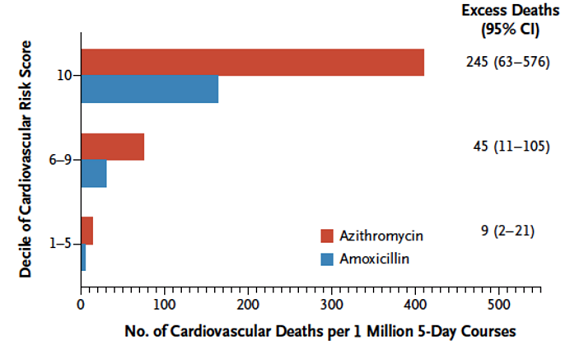Should We Stop Prescribing Azithromycin?
In 2011, Azithromycin was the seventh most prescribed (55.3 million prescriptions) medication according to IMS Health. There have been several publications indicating that the use of macrolide antibiotics increase risk of serious ventricular arrhythmias and sudden cardiac death (FDA Adverse Event Reporting System). Specifically, two recent studies in NEJM were published looking at the risk of Azithromycin with cardiovascular death and received lots of press recently.

What They Did:
- Retrospective, Observational Cohort Study
- Tennessee Medicaid Cohort
- Compared
- 1. No antibiotics (1,391,180 prescriptions)
- 2. Azithromycin (347,795 prescriptions)
- 3. Amoxicillin (1,348,672 prescriptions)
- Detected an increased risk of death
- Cardiovascular death
- Death from any cause


- Cardiovascular Risk Factors in This Study: Smoking, high BMI, poor diet, and low physical activity
- NO statistically significant risk of death after the 5 day course of azithromycin completed
- Observational, non-randomized clinical trial
 What They Did:
What They Did:
- Retrospective, Observational Cohort Study
- Danish Adults
- Compared
- No antibiotics vs Azithromycin (1,102050 prescriptions compared in 1:1 ratio)
- Azithromycin vs Pencillin V (1,102,419 prescriptions vs 7,364,292 prescriptions)
- Cardiovascular Death
- No increase in cardiovascular death with recent or past use of azithromycin
- No increase in cardiovascular death in patients with no history of cardiovascular disease
- There is an increase in cardiovascular death in patients with a history of cardiovascular disease
- Did not have information of known risk factors for cardiovascular disease (smoking and BMI)
- Number of events in the subgroup analysis is low
In my opinion, how will this affect your practice?
- In the second study the patient population had better cardiovascular health than the first study
- The increased cardiovascular risk may be from the systemic infectious process and not azithromycin itself
- You can still prescribe azithromycin, but remember the small increased risk of death in patients with cardiovascular disease
References: 1. Ray WA et al. Azithromycin and the Risk of Cardiovascular Death. NEJM 2012: 366 (20); 1881 – 90. PMID: 22592294 2. Svanstrom H et al. Use of Azithromycin and Death from Cardiovascular Causes. NEJM 2013 May; 368 (18); 1704 – 1712. PMID: 23635050 _______________________________________________________________________________
Dr. Salim R. Rezaie is a physician at the University of Texas Health Science Center at San Antonio. He is double board-certified in Emergency Medicine and Internal Medicine.









Dr. Rezaie, indeed a common debate in outpatient clinics: should we be prescribing azithromycin as much as we do? I’ve adopted the same approach as you outlined: we need to think twice before ordering azithromycin in patient with heart disease but overall the risk is not high.